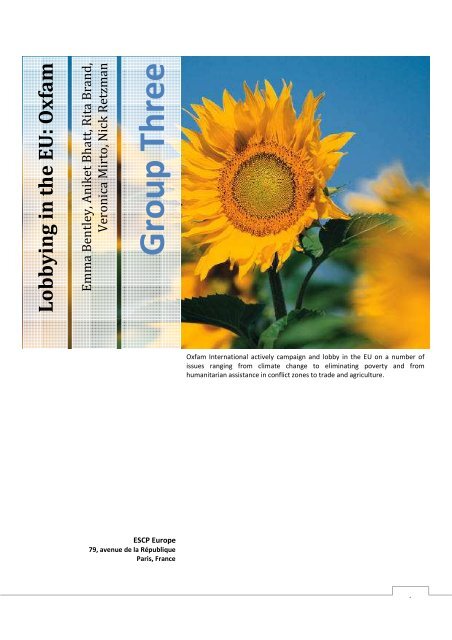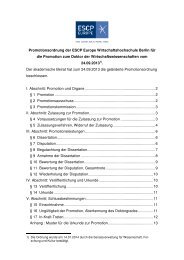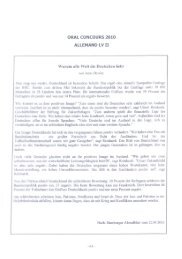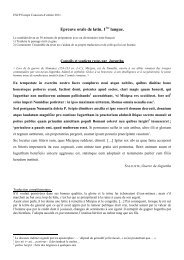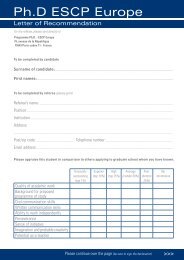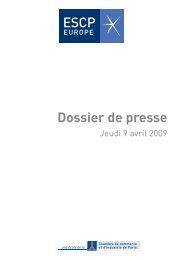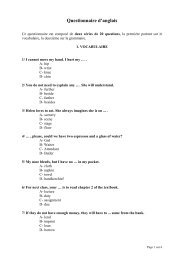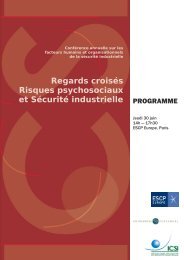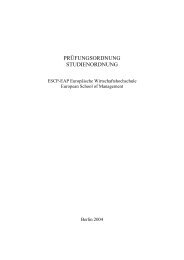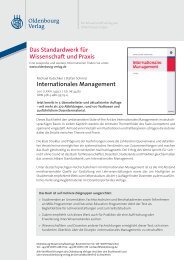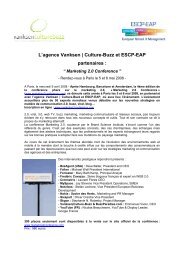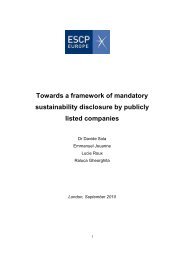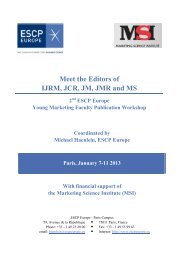MEB Oxfam Lobbying Report June 2011x - ESCP Europe
MEB Oxfam Lobbying Report June 2011x - ESCP Europe
MEB Oxfam Lobbying Report June 2011x - ESCP Europe
Create successful ePaper yourself
Turn your PDF publications into a flip-book with our unique Google optimized e-Paper software.
<strong>Lobbying</strong> in the EU: <strong>Oxfam</strong><br />
Emma Bentley, Aniket Bhatt, Rita Brand,<br />
Veronica Mirto, Nick Retzman<br />
Group Three<br />
<strong>ESCP</strong> <strong>Europe</strong><br />
79, avenue de la République<br />
Paris, France<br />
<strong>Oxfam</strong> International actively campaign and lobby in the EU on a number of<br />
issues ranging from climate change to eliminating poverty and from<br />
humanitarian assistance in conflict zones to trade and agriculture.<br />
1
<strong>Lobbying</strong> in the EU: <strong>Oxfam</strong><br />
<strong>MEB</strong>: Group 3<br />
Emma Bentley, Aniket Bhatt, Rita Brand, Veronica Mirto, Nick Retzman<br />
TABLE OF CONTENTS<br />
<strong>Oxfam</strong>: An Overview .................................................................................................................................... 3<br />
Origin, Structure, Purpose and Sphere of Involvement ................................................................................... 3<br />
<strong>Oxfam</strong> in Brussels........................................................................................................................................... 3<br />
Mission .......................................................................................................................................................... 4<br />
<strong>Oxfam</strong>: <strong>Lobbying</strong> .......................................................................................................................................... 5<br />
<strong>Lobbying</strong> Activities ......................................................................................................................................... 5<br />
Current Campaigns ........................................................................................................................................ 6<br />
Bibliography ................................................................................................................................................ 7<br />
2
<strong>Lobbying</strong> in the EU: <strong>Oxfam</strong><br />
<strong>MEB</strong>: Group 3<br />
Emma Bentley, Aniket Bhatt, Rita Brand, Veronica Mirto, Nick Retzman<br />
OXFAM: AN OVERVIEW<br />
OXFAM –ORIGIN, STRUCTURE, PURPOSE AND SPHERE OF INVOLVEMENT<br />
<strong>Oxfam</strong> International, hereby known as “<strong>Oxfam</strong>”, was created by non-governmental organisations in 1995, aiming at<br />
reducing poverty and injustice on an international level. The name derives from the Oxford Committee for Famine Relief,<br />
which was founded in the UK in 1942 and which campaigned for food supplies for starving women and children in<br />
occupied Greece during the Second World War.<br />
The <strong>Oxfam</strong> International Secretariat is based in Oxford, UK and runs advocacy offices in Brussels, Geneva, New York,<br />
Washington DC and Brasilia. There are currently 15 member organisations of the <strong>Oxfam</strong> International confederation based<br />
in the following countries: Australia, Belgium, Canada, France, Germany, Great Britain, Hong Kong, Ireland, India, Mexico,<br />
The Netherlands, New Zealand, Spain and the United States.<br />
In addition to emergency relief, <strong>Oxfam</strong> also works on many long-term development programmes and is involved in<br />
campaigns for fair trade regulations, improved health and education, and the fight against the climate change amongst<br />
many more. Through the collaboration with more than 3,000 local partner organisations, <strong>Oxfam</strong> does so using the<br />
following activities:<br />
• Development: Works with other organisations and communities, both internationally and locally, in developing<br />
programs to eradicate poverty and other important problems across the globe.<br />
• Emergencies: In times of natural disasters or conflicts, <strong>Oxfam</strong> helps on the ground by providing those affected<br />
with basic necessities, medicines, food etc.<br />
• Campaigning: Launches campaigns to the general public to increase their knowledge and awareness of current<br />
pressing issues and to encourage them to take part in <strong>Oxfam</strong>’s activities.<br />
• Advocacy: Trying to change certain rules and regulations which will help eradicate poverty, injustice by lobbying<br />
or putting pressure on decision makers.<br />
• Policy research: Due to <strong>Oxfam</strong>’s extensive global experience and presence, they can analyse and develop policies<br />
and then attempt to persuade the decision makers, for example, those in Brussels, to implement these policies.<br />
OXFAM IN BRUSSELS<br />
From the dedicated <strong>Oxfam</strong> Campaign and Advocacy Office located on Rue de la Science in the administrative heart of<br />
Brussels, <strong>Oxfam</strong> seek to influence EU policy in the areas in which <strong>Oxfam</strong> are active. The Brussels office ensures that EU<br />
officials, <strong>Europe</strong>an politicians, as well as the media, have all the latest <strong>Oxfam</strong> analysis and policy proposals. They<br />
constantly look to increase the influence they can exert over policy-makers by maintaining positive working relationships<br />
firstly with influential figures in the EU, as well as with other like-minded lobbying groups and NGOs also based in Brussels.<br />
3
<strong>Lobbying</strong> in the EU: <strong>Oxfam</strong><br />
<strong>MEB</strong>: Group 3<br />
Emma Bentley, Aniket Bhatt, Rita Brand, Veronica Mirto, Nick Retzman<br />
MISSION<br />
<strong>Oxfam</strong> believes every human being should have the following five basic human rights. These are listed below.<br />
• Livelihood: <strong>Oxfam</strong> condemn all exploitative trade policies, and in turn advocate an improvement in working<br />
conditions, especially for women.<br />
• Basic Services: <strong>Oxfam</strong> actively campaign for provision of health services and education for all. They use fundraising<br />
campaigns to generate more aid and they look for new methods of spending this aid in more effective<br />
manners. They also educate and provide training for local people about clean water and basic health services.<br />
• Be safe from harm: In dangerous emergency situations, <strong>Oxfam</strong> provide people with all the basic amenities as well<br />
as helping to rebuild the community so that the inhabitants live in safety and security.<br />
• Be heard: There are two elements to this category – individual and political. The first element is to represent<br />
those people whose voices are not heard and in these cases, <strong>Oxfam</strong> will help ensure their voice is loud enough to<br />
be heard. The second element is that <strong>Oxfam</strong> will put pressure on influential figures to make sure that they are<br />
listening and acting upon what they have heard.<br />
• Be treated as equal: <strong>Oxfam</strong> also campaign against any sort of discrimination on grounds of religion, disabilities<br />
etc and help people attain all essential services, jobs.<br />
It is with these firmly in the forefront of the mind that <strong>Oxfam</strong> operates and develops all of its policies, both for the EU and<br />
internationally. This can be demonstrated by looking at the more concrete campaigns and lobbying activities that <strong>Oxfam</strong><br />
have been tirelessly engaging in.<br />
4
<strong>Lobbying</strong> in the EU: <strong>Oxfam</strong><br />
<strong>MEB</strong>: Group 3<br />
Emma Bentley, Aniket Bhatt, Rita Brand, Veronica Mirto, Nick Retzman<br />
LOBBYING<br />
LOBBYING ACTIVITIES<br />
<strong>Oxfam</strong>´s efforts to put pressure on decision makers focus on methods such as campaigns, advocacy, and the provision of<br />
policy analysis and proposals. The Brussels office directs <strong>Oxfam</strong>´s involvement and influence on <strong>Europe</strong>an Union policies.<br />
“Campaigning is the process of mobilizing people to join together to take action to challenge the powerful to make<br />
decisions to help benefit, not harm the powerless” 1<br />
This is central to <strong>Oxfam</strong>’s principles and so it comes as no surprise that <strong>Oxfam</strong> is very active launching and promoting new<br />
campaigns. It believes it is the best way to put decision makers under as much pressure as possible, in order to lead them<br />
to listen and take measures to solve the problems or issues that they are proposing or advocating. As you can see, this has<br />
two strands: firstly, appealing to the general public to increase their awareness of the issues and to ask for their support<br />
and the second to appeal to the EU decision makers and policy developers and this often takes place behind closed doors.<br />
<strong>Oxfam</strong> actively lobby EU officials and decision-makers on a regular basis whilst also maintaining good working<br />
relationships with leading representatives. <strong>Oxfam</strong> representatives are present at and participate in conferences as well as<br />
consultation and policy meetings. The Head of the EU Advocacy Office has a very public role, often giving media<br />
interviews, speeches and writing articles and papers on the whole range of issues that <strong>Oxfam</strong> campaign on.<br />
Many <strong>Oxfam</strong> employees keep a public blog http://blogs.oxfam.org/, but in particular, we would like to draw your<br />
attention to the <strong>Oxfam</strong> EU blog http://oxfameu.blogactiv.eu/ and to the very recent development that on the 31 st May<br />
2011, the Brussels office started their own Twitter account http://twitter.com/#!/<strong>Oxfam</strong>EU to keep the public as up to<br />
date as possible about their activities.<br />
<strong>Oxfam</strong> take pride in their good reputation and what we found very heartening was that <strong>Oxfam</strong> are partners in the climate<br />
category of a naming-and-shaming ‘competition’ for the worst lobbyists in the EU. The purpose of such a ‘competition’ is<br />
to discourage lobby groups from engaging in dirty tactics and under-handed activities by exposing them publically. For<br />
example, the ‘loser’ of the 2010 ‘competition’ was npower, the subsidiary of the German energy giant RWE, because<br />
although they were supposedly advocating environmentally friendly policies, they were in fact also lobbying to keep their<br />
highly-polluting oil and coal powered stations in use. 2<br />
1 What is Campaigning?, from http://youth.tearfund.org/students/campaign/what+is+campaigning.htm<br />
2 http://www.oxfam.org/en/pressroom/pressrelease/2010-12-02/worst-eu-lobbyists-2010-revealed-rwe-goldman-sachs-<br />
isda accessed 10 <strong>June</strong> 2011<br />
5
<strong>Lobbying</strong> in the EU: <strong>Oxfam</strong><br />
<strong>MEB</strong>: Group 3<br />
Emma Bentley, Aniket Bhatt, Rita Brand, Veronica Mirto, Nick Retzman<br />
CURRENT CAMPAIGNS<br />
The biggest campaign at the moment is one which <strong>Oxfam</strong> have very recently launched called “GROW” which is a global<br />
movement to provide food to everyone by tackling the related issues of climate change, rising oil prices and unfair trade,<br />
and the campaign has received the support and endorsement of many high-profile figures, such as Archbishop Emeritus<br />
Tutu and the former Brazilian President Lula. The Head of the <strong>Oxfam</strong> International EU Office, Elise Ford, believes that the<br />
EU can make a difference on this issue and she is campaigning strongly for the EU to get more involved: "the potent<br />
combination of power, policies and financial punch gives the <strong>Europe</strong>an Union the potential to shape the global food<br />
security debate.” 3<br />
This is a very ambitious campaign centred around the following three prongs:<br />
Growing better: investing in a new future for agriculture, giving to the smaller producers the resources to grow enough<br />
for themselves and the others. Sharing better: transforming how is now managed the food chain between farmers and<br />
consumers so as to ensure that people are not exploit, everyone can eat and benefits are fairly distributed. Living better:<br />
rethinking human notion of prosperity and developing better ways to run businesses, respecting world natural resources,<br />
deal with climate change ensuring next generations a better future.<br />
To generate more buzz for the GROW campaign, <strong>Oxfam</strong> have raised a blog, “From Poverty to Power” 4 , written by Duncan<br />
Green, Head of Research for <strong>Oxfam</strong> UK, that aims to follow success, effectiveness, real changes achieved from this new 4<br />
year <strong>Oxfam</strong> mega-campaign, providing papers, case studies, such as any evidence that common people are willing to<br />
witness.<br />
Other campaigns that <strong>Oxfam</strong> are involved in include:<br />
<strong>Oxfam</strong> is trying to generate support for the aptly named “Robin Hood Tax” by asking members of the public to write<br />
letters to G20 and <strong>Europe</strong>an Union leaders. <strong>Oxfam</strong> will then use this pressure from the public to add weight to their<br />
lobbying of the that the proposal should be implemented. This tax is for financial transactions made by bankers and the<br />
money generated can be used for eradicating poverty by providing education to all, fight climate change. This tax is<br />
expected to generate 200-500 billion dollars globally. This campaign is going on in Canada, Australia, France, and<br />
Germany.<br />
Concerning the provision of medical services in developing countries, <strong>Oxfam</strong> has recently submitted a report concerning<br />
Medicine Regulations in which it said that poor quality medicines are causing problems for patients in developing<br />
countries. They said that rich countries wants more intellectual property protection that health regulations and this will<br />
not solve the problem but might make generic medicines unaffordable for the people. It is campaigning that health<br />
regulations should be made a priority and rich countries should provide the technical and financial support for this.<br />
3 http://www.cafonline.org/Default.aspx?page=20174 accessed on 6 <strong>June</strong> 2011<br />
4 From Poverty to Power http://www.oxfamblogs.org/fp2p/?p=5591<br />
6
<strong>Lobbying</strong> in the EU: <strong>Oxfam</strong><br />
<strong>MEB</strong>: Group 3<br />
Emma Bentley, Aniket Bhatt, Rita Brand, Veronica Mirto, Nick Retzman<br />
BIBLIOGRAPHY<br />
http://www.oxfam.org/en/about/why<br />
http://www.oxfam.org/en/about/what<br />
http://www.oxfam.org/en/policy/eye-ball<br />
http://www.oxfam.org/en/policy/giving-developing-countries-best-shot-vaccine-access<br />
http://www.oxfam.org/en/getinvolved/jobs/head-office-eu-advocacy-110317<br />
http://www.oxfam.org/en/grow/reports/growing-better-future<br />
http://www.oxfam.org/en/grow/policy/averting-tomorrows-global-food-crisis<br />
http://oxfameu.blogactiv.eu/<br />
http://oxfameu.blogactiv.eu/grow-campaign/<br />
http://www.oxfamblogs.org/fp2p/?p=5591<br />
http://www.worstlobby.eu/2010/about<br />
http://www.cafonline.org/Default.aspx?page=20174<br />
http://euobserver.com/9/32412<br />
7


